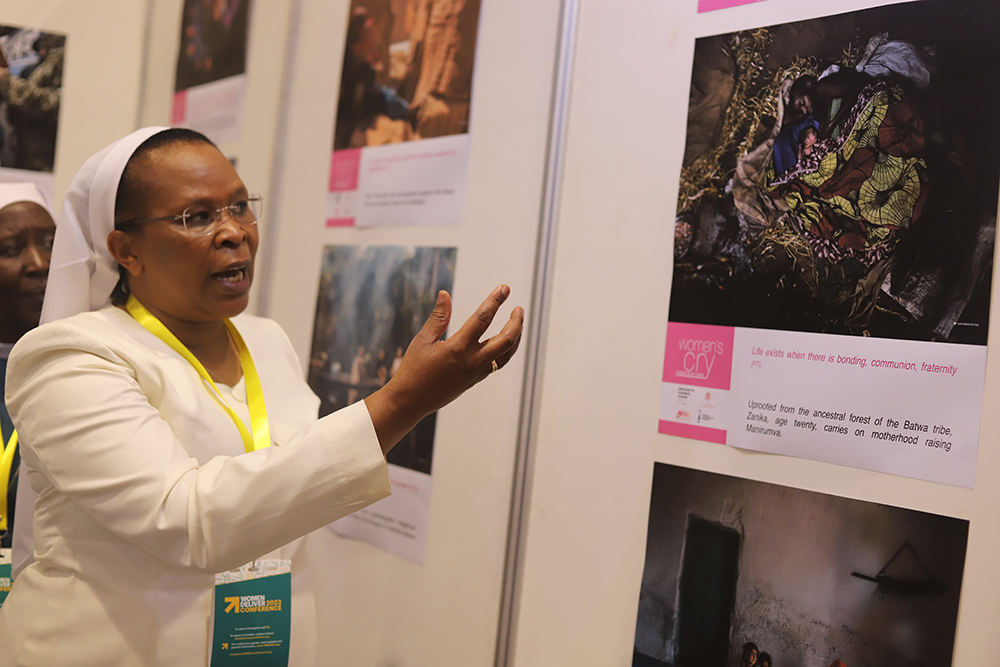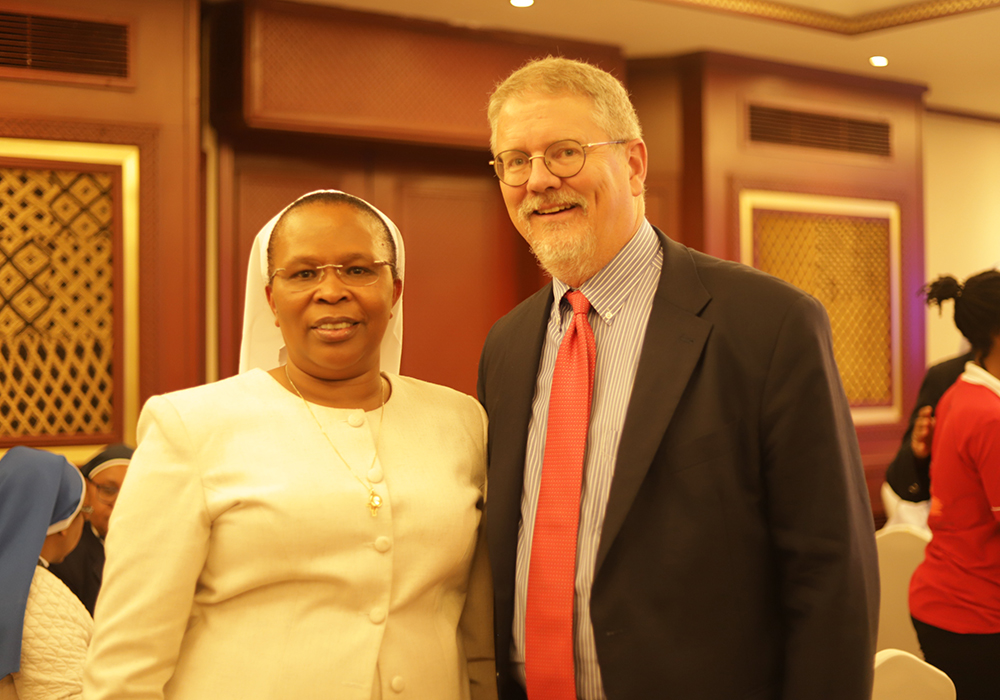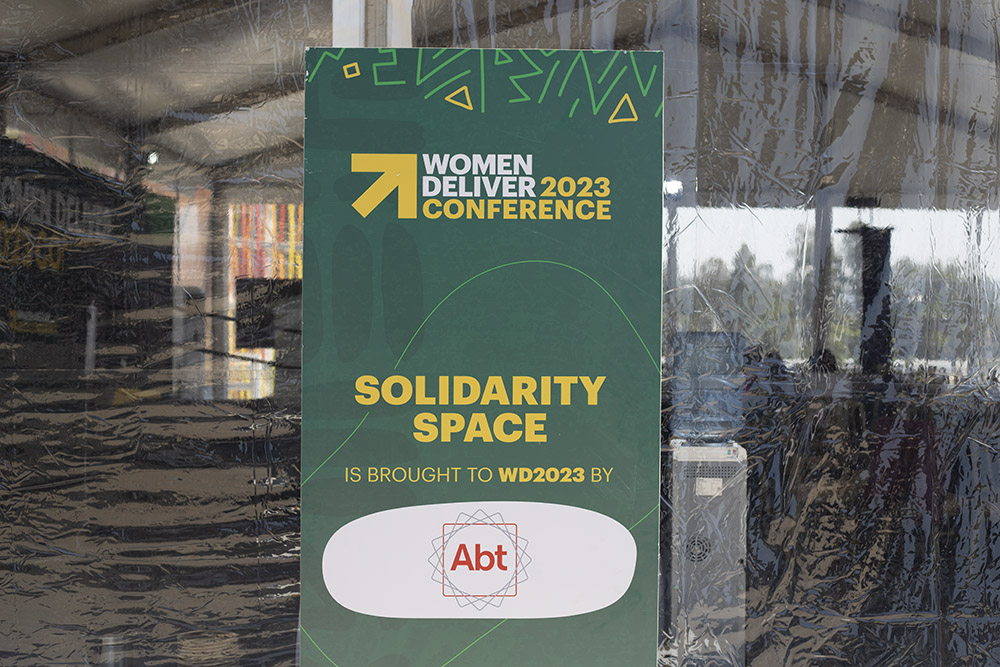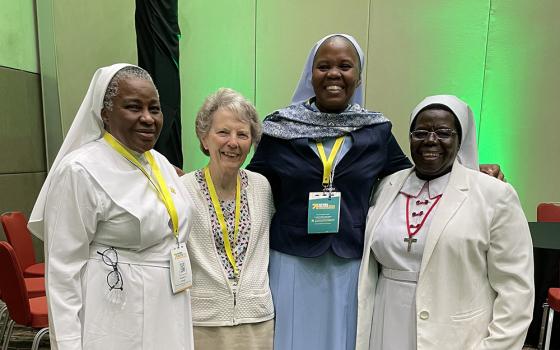
During a July 18 side event of the Women Deliver 2023 Conference in Kigali, Rwanda, Sr. Jane Wakahiu explains an image in which a woman is breastfeeding a newborn baby lying on the floor. Wakahiu, of the Institute of the Little Sisters of St. Francis, also highlighted some of the challenges women in poverty experience. (GSR photo/Doreen Ajiambo)
The Women Deliver 2023 Conference closed on July 20 after four days of intense work that made progress on several critical issues toward a more gender-equal world.
More than 6,000 feminist activists — including religious sisters, world leaders, grassroots advocates, the private sector, youths and government officials — attended the gathering at the Kigali Convention Centre in Kigali, the bustling capital city of Rwanda. More than 200,000 people followed the events online.
The conference, one of the largest gatherings dedicated to promoting gender equality, focused on gender equality, health, and the rights and well-being of girls and women. The theme was Spaces, Solidarity, and Solutions.
Issues on the agenda included women's rights on the African continent and worldwide, sexual and gender-based violence prevention, sexual and reproductive health and rights, climate change, technological innovation, and youth advancement programs.
During a side event on July 18, organized by the Conrad N. Hilton Foundation for Women in Faith Leadership Fellowship, religious sisters agreed that due to the new connections, ideas, inspiration, and solutions they had gained from the conference, they would commit to fighting to end female genital mutilation and early marriages. They also committed to promote the education of girls, women's empowerment, and entrepreneurship.
"The sisters have resolved to work alongside organizations that promote similar causes as they do at the grassroots level," said Sr. Jane Wakahiu, associate vice president of program operations and head of the Catholic Sisters Initiative at the Conrad N. Hilton Foundation. "The sisters also resolved to work towards mentoring young women and girls and advocate on their behalf on pertinent issues that impact women, including breaking the barriers that impede their development."

Sr. Jane Wakahiu, associate vice president of program operations and the head of Catholic Sisters Initiative at Conrad N. Hilton Foundation, poses for a photo with Peter Laugharn, the foundation's current president and chief executive officer. The Conrad N. Hilton Foundation, which funds GSR, is among the Women Deliver 2023 Conference participants in Kigali, Rwanda. (GSR photo/Doreen Ajiambo)
Wakahiu said the sisters, who are members of the Women in Faith Leadership Fellowship, a program designed to amplify "the visibility, vitality, and voice of Catholic sisters," have, as advocates for women and girls' empowerment, committed to mobilize other sisters and partner organizations to raise awareness about violence against women and girls.
The awareness campaign, she said, will be carried out during church services, local radio shows, workshops and various gatherings in local communities. The campaign will aim to educate women, girls and other stakeholders on all forms of gender-based violence, including domestic violence, sexual violence, forced and child marriage, female genital mutilation, and trafficking for sexual exploitation.
"The sisters pointed out that awareness raising on gender issues is fundamental in their social and economic empowerment work, but [so is] creating spaces for conversations in their workplaces, as well as working in solidarity with others to elevate their voices and explore solutions to these issues," said Wakahiu, a member of the Institute of the Little Sisters of St. Francis, Kenya.
Peter Laugharn, president and CEO of the Conrad N. Hilton Foundation (which funds Global Sisters Report), said the foundation will continue to fund religious sisters in this endeavor.
"We are here as an organization to pick lessons on how best we can support religious sisters to reach out to more vulnerable people, especially female refugees, and also improve on what we do as an organization," he told GSR.
Malala Yousafzai, the 2014 Nobel Peace Prize laureate and co-founder of the Malala Fund, said at the conference that she would continue to fight for the education of girls, their empowerment and their rights — urging governments to allow girls of all races and countries of origin access to equal and quality education.
"It's a continuous fight, as we are yet to have all girls able to receive 12 years of free, safe and quality education," she said during a July 18 Fireside Chat, moderated by Maliha Khan, president and CEO of Women Deliver. "I know I could choose to live a quiet life, but instead, I choose to continue to fight until every girl can go to school, so I can live to see a world where all girls are free to learn and lead."
Yousafzai, a renowned education activist, became a superstar and the youngest-ever Nobel Prize winner for her fight for the right to education after the Taliban shot her in 2012 in her home country of Pakistan for opposing restrictions on girls' education.
She urged world leaders to commit to promoting girls' education and gender equality, saying the leaders were better positioned to create and implement gender-friendly policies.
"I've met leaders who are sometimes hesitant and fail to use the right words. They make broad general commitments to gender equality but never mention what they plan to do to make it a reality," she said. "I tell them to begin by aiding girls fighting poverty, wars, child marriage, and gender discrimination to get into school."

A banner of the Women Deliver Conference at the Kigali Convention Center in Rwanda, held July 17-20. The conference theme is "Spaces, Solidarity, and Solutions." (GSR photo/Doreen Ajiambo)
Women's advocates, with the support of the Joint United Nations Programme on HIV/AIDS, or UNAIDS, launched an ambitious mission to end to HIV/AIDS by addressing inequalities and disrupt power dynamics that sometimes subject women to things like female genital mutilation, early and forced marriages, rape, sexual exploitation, lack of access to education and health care.
About 39 million people live with HIV, and at least 33 million people have died of AIDS-related causes since the beginning of the epidemic, according to UNAIDS statistics.
"We have resolved to assess issues that drive inequalities such as power imbalance, access to rights, and deeply-rooted harmful norms and practices," Jacqueline Utamuriza-Nzisabira, U.N. women African regional adviser on HIV and gender, said during the July 18 event. "We must challenge the traditional style that ignores women's abilities and empower them with the knowledge, resources and agency to protect and take charge of their own health."
Anne Githuku Shongwe, the UNAIDS regional support team director for Eastern and Southern Africa, said that it was time for stakeholders to take a bold step to end HIV/AIDS. "We can challenge the power dynamics that perpetuate the cycle of inequality and create the conditions necessary to end AIDS by building a healthier and more equitable world for all," she said.
At the conference, world leaders committed to raising money to support women's and girls' health and education for all, regardless of gender. The leaders also committed to ending female genital mutilation, pushing more women to powerful national and local positions, ending all other forms of gender-based violence and tackling climate change.
Advertisement
Senegal's President Macky Sall pledged 150 scholarships to Afghan girls to pursue university education in Rwanda after some female activists lamented that the inability to pay fees deprived girls of Afghanistan an opportunity to access education in other countries.
Meanwhile, the World Health Organization and other U.N. agencies launched a new digital resource known as RESPECT, which seeks to "support evidence-based actions in policies and programmes" that prevent and respond to violence against women and girls.
"Violence against women and girls remains an immense crisis," said Dr Pascale Allotey, director of sexual and reproductive health and research at WHO, and head of the U.N. special program on human reproduction.
"Governments need to 'walk the talk' in investing in evidence-based resources for violence prevention and response, while advancing gender equality."








